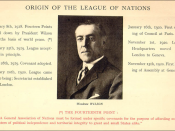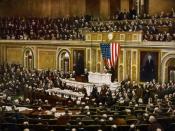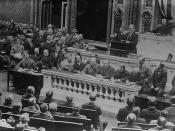The failure of the United States Senate to ratify the Treaty of Versailles resulted, not from the stubbornness and ineptitude of one man or political faction, but from the collective obstinacy of President Woodrow Wilson and the Internationalists, the Reservationists, and the Irreconcilables, coupled with the sudden loss of Wilson's campaign ability.
President Wilson, after months of debating with other important heads of state among the Allies, persistently campaigned for full acceptance of the terms of the Treaty of Versailles, especially the formation of the League of Nations, which he himself insisted upon being included in the Treaty during negotiations. Wilson said in reference to the League, "[The founders of the Government] though of America as the light of the world as created to lead the world in the assertion of the rights of peoples and the rights of free nations . . . this light the opponents of the League would quench."
In his battle to promote the Treaty and the League, Wilson made a controversial move by appealing to the public, asking it to reelect a Democratic Congress because "a vote for the Republicans, he argued, would undercut his ability to fashion a just and lasting peace" (Lindsay). The country, however, rejected his plea, electing a Republican majority into Congress and providing him with no extra support. Wilson was so unwilling to compromise that when the Treaty was presented to the Senate for voting with the reservations, after already having been rejected once without reservations, he directed his followers, the internationalists, to reject any reservations, even at the cost of defeating the Treaty altogether, which in fact occurred (Newman 460). President Wilson's refusal to compromise became a major obstacle in the ratification of the Treaty of Versailles.
Like President Wilson, his political opponents, the Reservationists and the...


